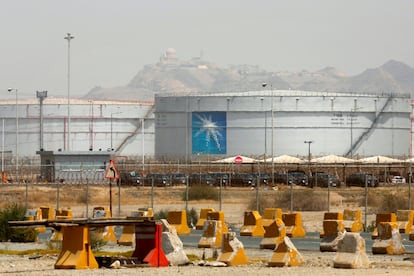Saudi Arabia extends cut of 1 million barrels of oil a day, potentially boosting prices at the pump
The Saudi cut of 1 million barrels per day, which began in July, comes as the other OPEC+ producers have agreed to extend earlier production cuts through next year

Saudi Arabia said Thursday it will extend its unilateral production cut of 1 million barrels of oil a day through the end of September in its effort to boost flagging energy prices, a move that could push U.S. gas prices higher.
The Saudi reduction, which began in July, comes as the other OPEC+ producers have agreed to extend earlier production cuts through next year.
The national average for U.S. gas prices stood at about $3.82 a gallon on Tuesday — about 30 cents higher than a month ago, according to motor club AAA. While today’s prices at the pump remain far lower than they were last year, when energy costs soared worldwide in the months following Russia’s invasion of Ukraine, experts say such a jump is unusual.
This year’s record-breaking summer heat has also had an impact, driving up demand for air conditioning and forcing refineries to operate at reduced capacity.
The kingdom announced the extension in a statement on the state-run Saudi Press Agency, quoting an anonymous official in the Energy Ministry. The official added that the cut “can be extended or deepened” if the need arises.
“This additional voluntary cut comes to reinforce the precautionary efforts made by OPEC+ countries with the aim of supporting the stability and balance of oil markets,” the official said.
The move was widely expected by analysts.
Benchmark Brent crude traded Thursday at over $80 a barrel.
A series of production cuts over the past year has failed to substantially boost prices amid weakened demand from China and tighter monetary policy aimed at combatting inflation. Brent has largely hovered between $75 and $85 a barrel since last October.
The Saudis are particularly keen to boost oil prices in order to fund Vision 2030, an ambitious plan to overhaul the kingdom’s economy, reduce its dependence on oil and create jobs for a young population. The plans include several massive infrastructure projects, including the construction of a futuristic $500 billion city called Neom.
Higher prices would also help Russian President Vladimir Putin fund his war on Ukraine, as Western countries have used a price cap to try to cut into Moscow’s revenues.
Western sanctions mean Moscow is forced to sell its oil at a discount to countries like China and India. Its estimated export revenue fell by $1.4 billion to $13.3 billion in May, down 36% from a year ago, the International Energy Agency said in a report in June.
Sign up for our weekly newsletter to get more English-language news coverage from EL PAÍS USA Edition
Tu suscripción se está usando en otro dispositivo
¿Quieres añadir otro usuario a tu suscripción?
Si continúas leyendo en este dispositivo, no se podrá leer en el otro.
FlechaTu suscripción se está usando en otro dispositivo y solo puedes acceder a EL PAÍS desde un dispositivo a la vez.
Si quieres compartir tu cuenta, cambia tu suscripción a la modalidad Premium, así podrás añadir otro usuario. Cada uno accederá con su propia cuenta de email, lo que os permitirá personalizar vuestra experiencia en EL PAÍS.
¿Tienes una suscripción de empresa? Accede aquí para contratar más cuentas.
En el caso de no saber quién está usando tu cuenta, te recomendamos cambiar tu contraseña aquí.
Si decides continuar compartiendo tu cuenta, este mensaje se mostrará en tu dispositivo y en el de la otra persona que está usando tu cuenta de forma indefinida, afectando a tu experiencia de lectura. Puedes consultar aquí los términos y condiciones de la suscripción digital.








































